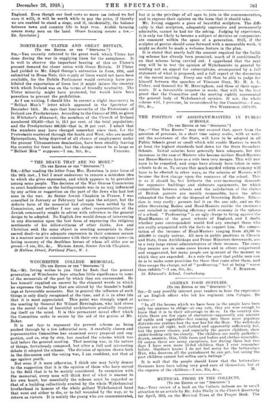THE POSITION OF ASSISTANT-MASTERS IN PUBLIC SCHOOLS.
[To THE EDITOR Or THE " SPECTATOR.")
SIR,—" One Who Knows" may rest assured that, apart from the question of pensions, in a short time salary scales, with or with-
out the assistance of the State, will have to be adopted in all
Public Schools great or small which will enable Masters to reach at least the highest standards laid down for the State Secondary Schools. Initial salaries have generally been adequate, but the increases in the case of Masters who become neither Head-Masters nor House-Masters have as a rule been very meagre. This will now have to be remedied, and steps have already been taken in some schools to do so. To secure this much-needed reform economy will have to be effected in other ways, as the &dark* of Masters will become the first chaege upon the resources of the school. This is as it should be, but hitherto the ever-increasing demands for expensive buildings and elaborate equipments, for which competition between schools and the satisfaction of the claims of British parents are mainly responsible, have too often exhausted the funds at the disposal of Governing Bodies. Educa- tion is very costly : parents feel it on the one side, and on the other Governing Bodies and Head-Masters realize the enormous cost entailed in combining efficiency with economy in the upkeep of a school. "Profiteering" is an ugly charge to bring against the Head-Masters of the great schools of England, and I doubt whether your correspondent would find any amongst those who are really acquainted with the facts to support him. His compu- tation of the incomes of Head-Masters ranging from £3,500 to .810,000 is simply untrue. All men in public positions in Church and State, from Archbishops and Prime Ministers downwards, are to a very large extent administrators of their incomes. The sums they receive are in some cases known and in others conjectured and exaggerated, but many people are ignorant of the manner in which they are expended. As a rule the most that public men can do is to make some provisien for those that came after them, and thus escape the charge, not of "profiteering," but of being" worse than infidels."—I am, Sir, &c., AV. F. BURNSIDE. St. Edmund's School, Canterbury.


























 Previous page
Previous page